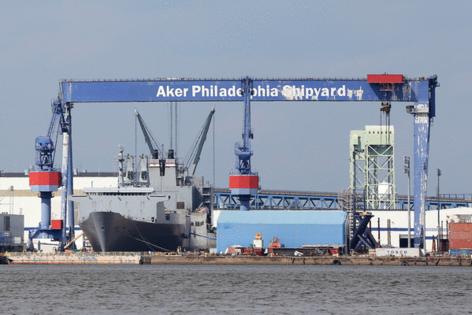Philly Shipyard backs Trump plan to counter China shipbuilding -- as critics fear supply chain disruptions
Published in Political News
PHILADELPHIA -- The owner of Philadelphia’s commercial shipyard is backing a Trump administration proposal that aims to counter China’s dominance in shipbuilding and subsidize domestic industry following decades of declining production.
The Trump administration in February proposed charging Chinese shipping companies and other ocean carriers that use Chinese-built ships millions of dollars in fees every time they enter a U.S. port.
That has prompted howls from a wide array of American businesses and trade groups representing shipping companies, retailers, farmers, and others who say the the fees would increase costs and disrupt supply chains.
But Hanwha Group, the South Korea-based conglomerate that bought Philly Shipyard last year for $100 million from Norway-based Aker Group and other shareholders, has emerged as a rare voice of support for the fees. Hanwha Shipping, the company’s Texas-based affiliate, said the U.S. Trade Representative’s proposal would “support the regeneration of the United States commercial maritime capabilities, especially in the emerging area of liquid natural gas (‘LNG’) and crude-oil exports.”
“Hanwha Shipping is committed to supporting the United States in building and operating such a fleet, with plans to deploy state of the art vessels that are economically viable and where needed, militarily useful,” company vice president Ryan Lynch wrote in a letter to U.S. Trade Representative Jamieson Greer ahead of hearings this week in Washington, D.C.
Critics warn of higher consumer costs
But in a bid to boost domestic shipbuilding, critics said, Trump’s plan would harm other U.S. businesses and consumers. “A large fee on vessels calling at United States ports will raise the price of shipping and will be passed on from ocean carriers to cargo owners, and thus consumers,” Cary Davis, president and CEO of the American Association of Port Authorities, wrote in a letter to Greer.
“Imposing this fee at our ports could also risk diverting cargo to Canadian and Mexican ports, depriving our coastal communities of cargo throughput that creates jobs and funds infrastructure improvements,” Davis said.
The Philadelphia Regional Port Authority, a state agency that owns several Delaware River terminals, is monitoring the debate. Ocean shipping lines “may start reducing some of their ship calls and skipping some ports, so that one definitely can have an impact on us,” Ryan Mulvey, the port authority’s director of government and public affairs, said during a March 19 board meeting.
In addition to imposing fees on Chinese vessels, the proposal would also require that in the first year of its enactment at least 1% of U.S. products shipped overseas must be exported by U.S. operators. Within seven years, that restriction would increase to 15% of U.S. goods, of which 5% must be carried on U.S.-built vessels.
The National Retail Federation and other business groups warned that timeline was unrealistic, saying the U.S. Trade Representative’s proposal would “force a reduction in U.S. exports.” U.S. ships could not be built quickly enough to meet those goals, the federation argued.
China’s market share
The Trump proposal came after several labor unions petitioned the Biden administration last year to investigate China’s targeting of the maritime, shipbuilding, and logistics sectors. That probe led to a report in the final weeks of the Biden administration that found China’s top-down industrial planning has undercut competition and threatens U.S. economic security.
China’s market share of global ship production has increased from 5% in 2000 to more than 50% today, the report said. The United States built large fleets of naval and commercial vessels during World War II — with the help of more than 40,000 workers at the Philadelphia Naval base, the site of the current commercial shipyard — and continued to innovate in subsequent decades.
But over the past 50 years, the report said, the number of commercial shipyards has “plunged,” costing tens of thousands of jobs. Today, the U.S. only produces a “fraction” of 1% of the world’s commercial vessels, according to the trade representative.
In addition to the fee proposal, President Donald Trump is reportedly considering issuing an executive order that is similarly aimed at countering China’s maritime dominance, the Wall Street Journal reported.
The South Philadelphia yard continued as a Navy shipbuilding site until it closed in 1996, then became a private, for-profit facility.
Since 2000, the partly state-financed Philly Shipyard has delivered about half of all U.S. commercial ships that transport goods between American ports, according to Hanwha. The federal Jones Act requires that U.S. goods shipped to Hawaii, Puerto Rico, and other noncontiguous parts of the country must be carried on U.S.-built vessels.
Today the yard employs about 1,700 people. Last year Philly Shipyard began construction on the first of three containerships for Matson Navigation Company, a Hawaii-based operator, after winning a $1 billion contract in 2022. Hanwha has said it wants to expand into producing naval vessels as well.
______
©2025 The Philadelphia Inquirer, LLC. Visit at inquirer.com. Distributed by Tribune Content Agency, LLC.




























































Comments